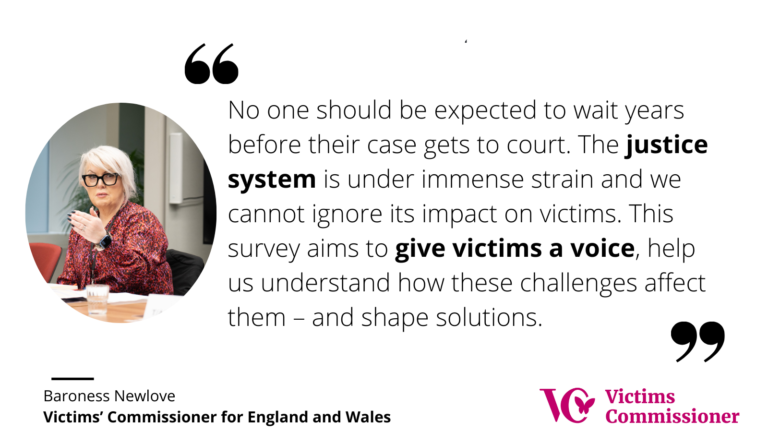BLOG: Victims are losing faith in our justice system – my survey must be a wake-up call

Baroness Newlove says victims are being let down by the criminal justice system after she surveyed more than 3,000 people about their experiences. "Victims have spoken: now it’s time for criminal justice agencies – and the new government – to listen."
This op-ed first appeared in The Daily Mirror on 27 August 2024 and accompanied the launch of the Victims’ Commissioner’s annual victim survey.
All victims are affected by crime. Whether it’s a violent assault, a life-altering injury, the loss of a loved one, or a deeply personal violation; victims carry the weight of their experience throughout the criminal justice process and beyond. This is a truth, sadly, I know all too well.
But too often, our criminal justice system fails to adequately support those it is meant to protect. As my landmark victim survey shows, too many victims are dissatisfied with the police, the Crown Prosecution Service (CPS), our courts – and the justice system in general.
Many feel like an afterthought – a bystander to proceedings, left guessing about the status of their case or stuck in limbo waiting for a court date. When this happens, victims suffer twice: once from the crime itself and then again when their pleas for help go unheard.
As Victims’ Commissioner, my role is to champion victims – a responsibility I take very seriously. That’s why I commissioned the largest victim survey my office has ever carried out. More than 3,000 victims across England and Wales were asked about their experiences with police, CPS, the courts, and victim services. They were also asked if they felt the justice system is fair, effective – and capable of providing victims with justice.
The findings are stark: victims are losing faith in our justice system. Almost three quarters (73%) questioned whether reporting a crime will lead to justice. This is a major wake-up call – and brings into sharp focus the fact that one-third of victims in my survey never reported the crime to police in the first place. If crimes go unreported, victims – and the safety of our communities – will suffer.
Dissatisfaction with police runs deep. Two fifths (40%) of those whose crime was reported were dissatisfied with police response. Victims told me of reports not being taken seriously, leads not actively pursued and failures to share information in a timely and appropriate way.
These negative experiences cut across all victim groups, with a particularly concerning trend emerging for disabled victims. Nearly half (45%) of disabled victims were dissatisfied with the police. They were also less likely to report a crime in future. Their disappointment is entirely understandable; it seems agencies fail to make the adjustments necessary for a disabled victim to be heard and have their story accurately captured. Who you are should – and must – not dictate the treatment and support you receive – or your chances at justice.
The report also revealed a troubling awareness gap: less than a fifth of (19%) of victims were aware of the Victims’ Code, the official document setting out their rights. If victims are unaware of their rights, how can they challenge criminal justice agencies if they fail to deliver?
Whilst we still have a way to go to ensure that every victim receives the treatment and support that they deserve, I know it can be done. Many victims shared inspiring stories of compassion and support from dedicated professionals working within the criminal justice system, often under immense pressure.
It is important the justice system listens to victims and not just talk at them. It should communicate with victims willingly, sensitively and appropriately. It should give victims a voice, making them feel like a participant and not an onlooker – that’s the kind of justice system that will help victims cope and recover. It can bring some catharsis, regardless of the outcome in – or outside of – court. It also encourages other victims to come forward.
On the other hand, a justice system that leaves victims feeling unsupported will only add to the trauma of the crime and drive disillusionment, with victims and witnesses simply walking away. So, let’s be clear: victims deserve better. As the new government begins its work, the justice system is grappling with Crown Court backlogs, lengthy waits for justice and overcrowded prisons. I fully acknowledge the magnitude of these challenges. However, rebuilding victims’ trust in the criminal justice system must be an absolute priority.
